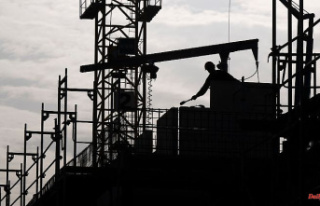2022 was a difficult year for anyone looking to build or buy a property. Interest rates rose sharply - a development that experts say is likely to continue. At least there is hope that the rise could slow down a bit.
After building interest rates soared this year, experts expect moderate increases in 2023. They consider it unlikely that interest rates will fall again permanently. The major central banks have announced that they will continue to raise key interest rates in the fight against inflation. After all: According to financial advisors, falling building interest rates are possible in the coming months. Mirjam Mohr, private customer board member at the credit broker Interhyp, says: "In 2023, construction interest rates will in all likelihood not rise as much as in 2022." You expect moderate increases.
"The interest rates remain under pressure," says Michael Neumann, head of the credit broker Dr. Small. There is no telling when inflation will drop significantly and permanently. "If expectations remain high well into next year - and I'm assuming that will be the case at the moment - the ECB will have to tighten monetary policy further in the first few months of 2023." Then interest rates would rise again.
The European Central Bank recently raised its forecast for inflation in the euro zone and announced further interest rate hikes. The US Federal Reserve also wants to raise interest rates, even if the steps are now likely to be smaller. This year, construction interest has increased from just under one percent to around 3.5 percent for ten-year loans. The 4 percent mark was briefly reached in autumn. The reason for the upward pressure was the rising interest rates. In anticipation of a tighter monetary policy, the yields on federal bonds, on which building interest rates are based, shot up.
The rapid increase in interest rates surprised even experts. Max Herbst, founder of the Frankfurt-based FMH financial consultancy, spoke of the strongest growth since 1999. It is unlikely that interest rates will rise again like this in 2023. Nobody knows how interest rates will develop. Since they are based on federal bonds, the interest rates depend essentially on "how big investors like to lend their money to the German state - and on what terms," explains FMH-Finanzberatung. She expects moderate interest rate increases in 2023. In the spring, there could be a slight drop to around 3 percent before picking up again to 3.5 to 3.75 percent, the financial advisers estimate.
When choosing the term, borrowers should ask themselves what interest rates they expect in the medium or long term, advises FMH Finanzberatung. Assuming that interest rates will be significantly lower in five years than they are today, a short term is recommended. On the other hand, if interest rates are expected to rise, hedging for 20 years makes sense. "Security costs money, but creates long-term certainty about one's own burden."












